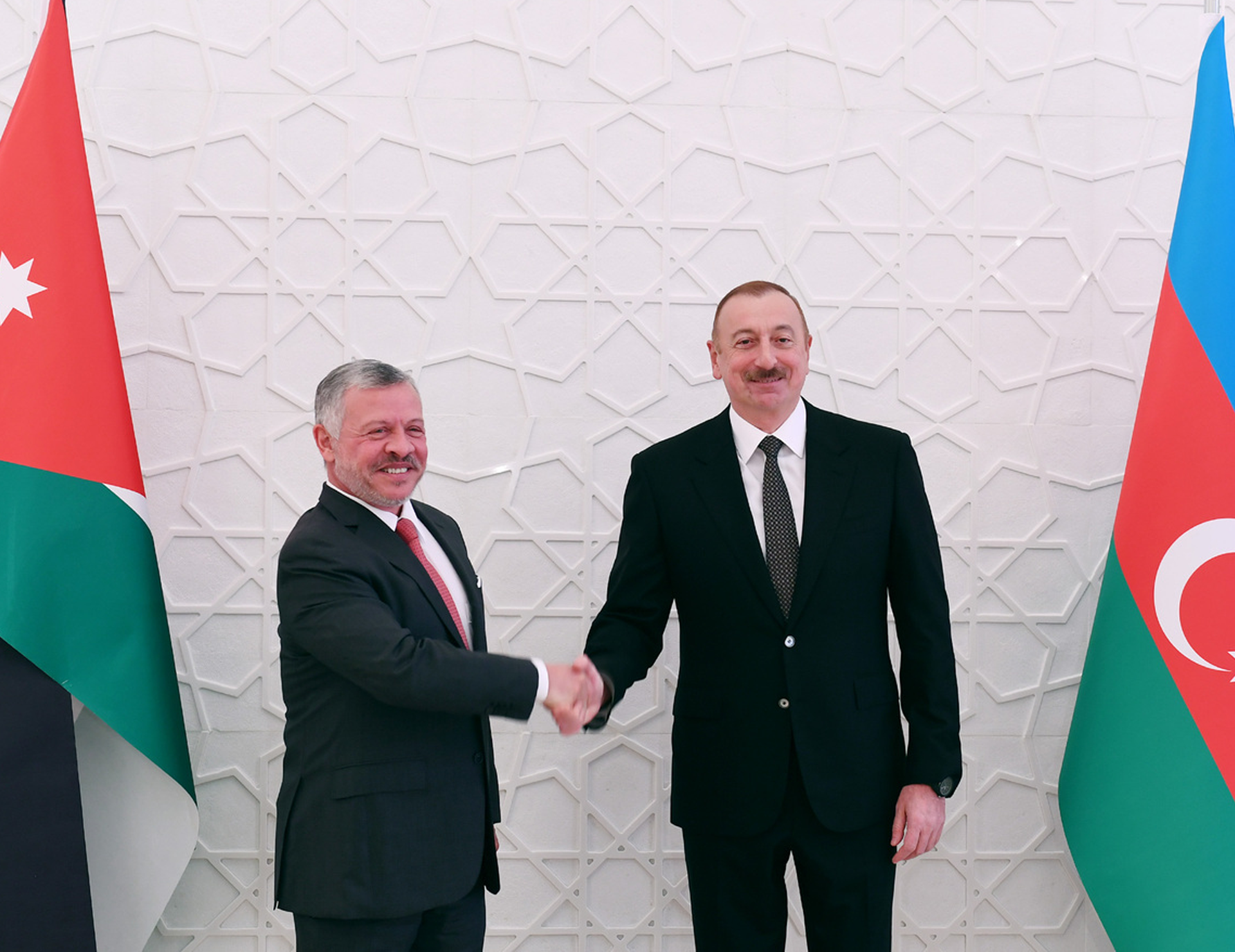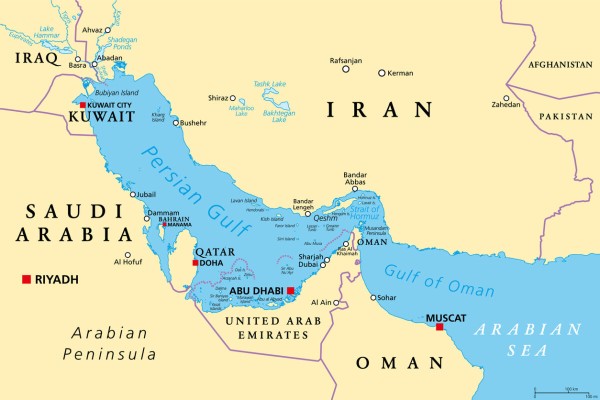Azerbaijan-Jordan: recent developments and future cooperation to curb the Shia Crescent

Shia Crescent goes “Full Moon” post-October 7
During the Global War on Terror in the early 2000s, King Abdullah II of Jordan coined the term “Shia Crescent” to describe the Iranian grand strategy of large-scale and wide-ranging ideological armed struggle to create a Shiite empire from Tehran to Damascus. There is no other way to describe his conception except for a self-fulfilling prophecy, one where the Israel-Hamas War has revealed truly how threatening Iran-backed militia groups are to the security and stability of the region.
In the Levant, Shia-led Hezbollah and to a lesser extent Hamas, a formally Sunni network supported by Tehran, are at war with Israel, executing Tehran’s plan to eliminate the Jewish State. Along the Euphrates, Shiite groups like Harakat al-Nujaba militia and the al-Sadr Movement have a chokehold on the Iraqi government, making the state a de jure Iranian satellite. And in the Gulf, the Houthi movement’s piracy and attacks on international shipping vessels have completely destabilized the maritime commerce of the Red Sea such that trade through the Suez Canal has dropped by 50 percent from 2023-2024.
On the Footsteps of the Shia Crescent
Under a Hashemite monarchy and with a majority-Sunni population, this Crescent is an existential threat to the Kingdom of Jordan. Externally, the country is surrounded by Shia-majority areas in Lebanon, Syria, and Iraq, particularly Kata’ib Hezbollah (KH), which in April announced it is preparing an “Islamic Resistance in Jordan” that is ready to provide “12,000 fighters with light and medium weapons, anti-armor launchers, tactical missiles… so that [it] can be one hand to defend [their] Palestinian brothers.” If not for using Jordan as a launchpad to attack Israel, KH seeks to threaten the Western-backed monarchy as it did in January’s drone strikes on a U.S. military base in its easternmost territory leaving an American soldier killed, and through periodic cross-border smuggling of arms and narcotics to cells in Amman which increased since October 7th.
The Kingdom felt the size of the threat during Tehran’s unprecedented attack on Israel back in May, when the U.S. along with other Arab partners decided to singularly shoot down missiles to de-escalate tensions. Jordan’s involvement was simply remarkable given its condemnation of Israel’s actions in Gaza, but King Abdullah II reasserted that this decision was a means of stopping Jordan from turning into a “battleground” for the Israel-Iran proxy war. Jordan, with its coldblooded, geostrategic relationship with the Jewish State, will continue to be another “small Satan” in the eye’s of Iran’s “Axis of Resistance” and must be dealt with accordingly.
Azerbaijan, Iran’s northern neighbor, knows all too well how it feels to be called the “second Israel” by the Ayatollahs. For decades, Tehran maintained an adversarial approach to Baku, trying to endanger Azerbaijan’s stability and territorial integrity whenever possible. This was most evident in Iran’s strong financial and military support of Armenia during the Karabakh Conflict, as a counter to Israel’s support of Azerbaijan. Iran continued to provoke Azerbaijan for strategic relations with its sworn enemy, such as the 2023 Azerbaijani Embassy shooting in Tehran in killing one and injuring two, the failed attack on the Israeli Embassy in Baku by an Afghan national from Iran, and the support of a thousand-man protest against the Istanbul offices of Azerbaijan`s National Oil Company SOCAR back in June.
Azerbaijan, like Jordan, deals with its own Iran-backed Shia militia group, the Islamic Resistance Movement of Azerbaijan or self-styled Husseyniyun, founded in 2019. Iran is exporting its revolution to Azerbaijan in order to destabilize and radicalize the secular, sovereign state using subversion and the creation of Shiite terrorist cells, which ultimately began in the 1990s with the entrance of the Iranian Quds forces in Baku. Both Azerbaijan and Jordan’s security forces are successfully monitoring and foiling Iran’s tactics on their territories. However, after Azerbaijan’s victory in the 2020 Karabakh War and subsequent peace talks, as well as Baku’s new position as a regional military power backed by Turkey and respected by Russia, Iran has decided to thaw their frozen relationship. This materialized in the opening of Azerbaijan’s new, monumental embassy in Tehran on July 15, 2024, reopened for the sake of “mutual respect and good neighborliness” — not so much in cooperation, but in compelled contact.
Azerbaijan and Jordan, two in the same
Azerbaijan and Jordan are two states walking a tightrope between their relations with Israel, a partner against Shiite terror expansion and a satellite of the U.S.-led security umbrella; and Iran, a rogue state whose veiled regional power and foreign assets could devastate their respective territories. Furthermore, both are key partners with NATO: Jordan just received a NATO office in its capital to be a “beacon of stability in both regional and global contexts… in fighting transnational threats, including terrorism and violent extremism;” and Azerbaijan for nearly three decades has been “developing closer and closer ties with several NATO allies” like its alliance with Turkey, which allowed Baku to reach NATO-standard military power.
One would think these two Western-facing, security-driven states would be natural friends, but not much has been done bilaterally to truly upgrade their relations. Amman has for several decades supported Azerbaijan’s territorial integrity over Karabakh and even adopted a resolution on the Khojaly massacre committed by Armenian separatists in the 1990s. In turn, representatives from Azerbaijan’s armed forces have been long-time visitors of Amman’s Special Operations Forces Exhibition and Conference (SOFEX), and feature Jordanian arms companies at Azerbaijan International Defense Exhibition (ADEX). Overall, the relationship was “strategic” in name only.
Azerbaijan-Jordan recent cooperation
However, the Israel-Hamas War has been a red flag to both Azerbaijani and Jordanian statesmen that the perfect partnership was right in front of them. After October 7th, King Abdullah II of Jordan visited his Azerbaijani counterpart President Ilham Aliyev in Baku on February 22, 2023, the highest level bilateral meeting between the two states since before 2020. The two leaders discussed enhancing “efforts to achieve peace, strengthen security and stability in the Middle East'' in coordination with each other’s militaries, to which King Abdullah regarded relations with Baku as “high-level” and “brotherly.”
Relations were taken to the next level in April 2024 when Azerbaijani Defense Minister Colonel General Zakir Hasanov met with the Joint Chiefs of Staff Committee of the Jordanian Armed Forces Major General Yousef Huneiti in Amman. The two signed an agreement of defense cooperation that would enhance their “military-technical fields” and would “serve as a model for overcoming various challenges and difficulties.” Afterwards, Defense Minister Hasanov met with King Abdullah II, leading to a bilateral meeting between the two states’ defense advisory mutual defense operations and military education modules.
Next steps to curb the Shia Crescent
Azerbaijan-Jordan relations are still not where they could be. The Israel-Hamas War and the impending war against Hezbollah, with possible Iraqi and Syrian involvement, provides a stage to countries in opposition to the Crescent’s expansion to unite. Given Baku and Amman’s growing bilateral military relations, strategic relationship with Israel and aversion to Iran, there is no question who their natural allies are, that is, themselves.
They are in geostrategically important locations that, if connected through responsive military intelligence, would help mitigate further Iranian provocation. On one side, Jordan is wedged between Iran-allied Syria and Iraq but compensates for its precarious position by cooperating with its larger, militarily superior partner Saudi Arabia, which proved its allegiance to the West’s military institutions during their Iranian attack on Israel. On the other side, Azerbaijan blocks Iran’s expansion in the South Caucasus and with its alliance with Turkey, Iran’s NATO-backed regional rival, soft and hard power incursions are kept at bay.
A stronger military partnership between Azerbaijan and Jordan will require their leaders to understand a necessity for a partnership. As of late, the new cooperative agreements between the two states’ military forces is promising, but when Iran makes its penultimate strike on the Middle East, Azerbaijan and Jordan will naturally go through a close realignment.







